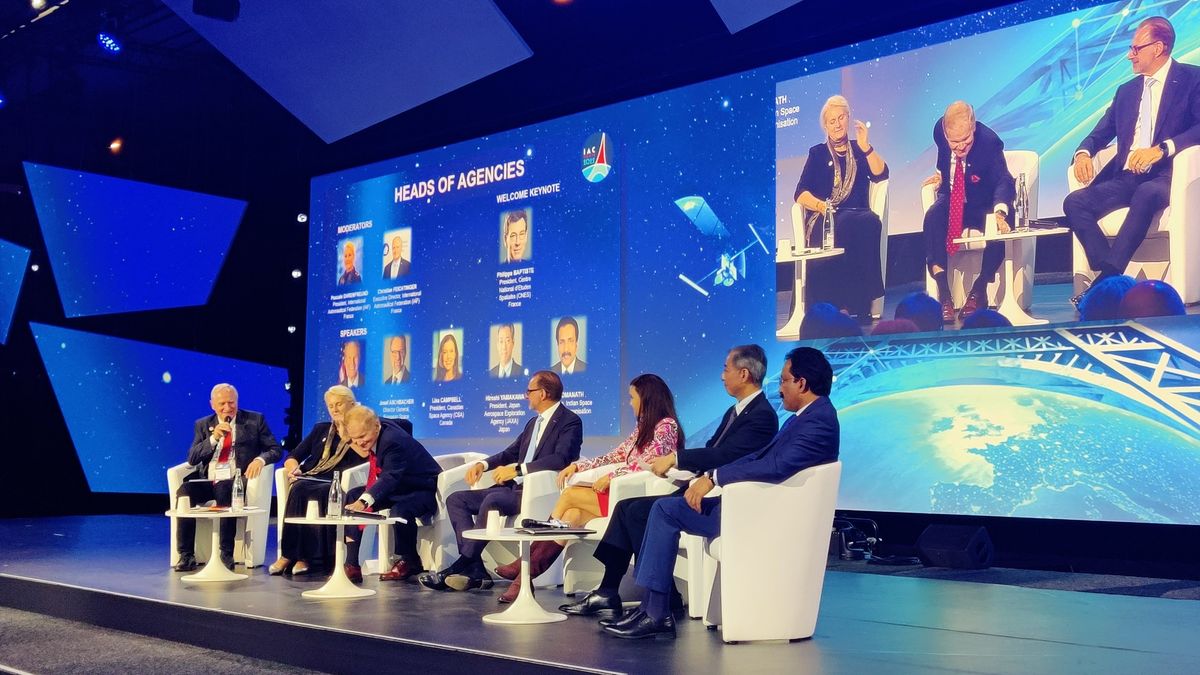PARIS — NASA Administrator Invoice Nelson instructed a serious worldwide space convention being held right here that the opportunity of cooperating with China in space is “as much as China.”
Nelson was requested concerning the potential of cooperation with China the moon throughout a Heads of Companies press convention on Sunday (Sept. 18), the opening day of the 73rd International Astronautical Congress (IAC).
“Cooperation with China is as much as China,” Nelson stated. “There needs to be an openness there, and that has not been forthcoming.” He famous that China and NASA have just lately coordinated over points such because the orbits of Mars spacecraft, however added that there’s a lack of wanted transparency on the Chinese language aspect.
Associated: How NASA’s Artemis moon landing with astronauts works
NASA and China have notably recognized a few of the same potential landing areas across the lunar south pole for his or her deliberate respective Artemis 3 and Chang’e 7 missions, elevating the query of whether or not and the way the companies would possibly coordinate their plans. (Artemis 3 will return astronauts to the moon’s floor for the primary time since 1972 and is focusing on launch in 2025; Chang’e 7, which does not but have a launch date, consists of an orbiter, lander, rover, relay satellite and a further robotic that may hop into craters to search for water.)
China was not available in Paris to reply to the problems raised. The China Nationwide House Administration (CNSA) had been anticipated to be represented within the Heads of Companies plenary session by vice administrator Wu Yanhua, however his profile disappeared from the occasion pages within the lead-up to the occasion. A spokesperson from the Worldwide Astronautical Federation (IAF), which runs the convention, instructed House.com that “Mr. Wu had a battle [in his] schedule and couldn’t come.”
Whereas Nelson’s feedback at face worth counsel NASA is open to a degree of dialogue, the company is basically prohibited from partaking bilaterally with China.Laws handed by Congress in 2011, generally known as the “Wolf amendment” for the congressperson who spearheaded it, arrange boundaries that limit authorities dealings with Chinese language state entities, equivalent to CNSA, with out prior permission and safety assurances.
Brian Weeden, director of program planning for Safe World Basis, a company targeted on cooperative options in space, instructed House.com that there must be “extra discussions between the U.S. and China on space actions, particularly on coordinating actions, however it will likely be arduous.”
“The Wolf modification makes it arduous, and U.S. home politics in China even tougher,” Weeden stated.
Nelson has additionally made essential comments on China’s lunar plans in current months, every time sparking sturdy responses from Chinese language state media.
America and China are every presently searching for partnerships for his or her visions for lunar exploration and it presently seems their efforts might be utterly separate tracks.
NASA is selling its Artemis Accords that lay out a framework for exploring the moon and is getting ready to launch the Artemis 1 mission, with crewed lunar missions to comply with later within the decade. China, in the meantime, is creating the capabilities required to aim to land astronauts on the moon and plans to build an Worldwide Lunar Analysis Station (ILRS) with Russia and different companions within the 2030s.
Regardless of bilateral points, it seems that NASA and China will make some efforts to speak intentions, notably in multinational contexts. NASA is “actively partaking with our worldwide companions to know their targets and pursuits in collaborating in future lunar floor actions,” a NASA spokesperson instructed House.com in an e mail in response to a request for touch upon makes an attempt to coordinate or talk about touchdown websites.
“Our objective is to ascertain a presence close to the moon’s south pole, from which a multi-national and collaborative infrastructure may be developed. NASA discusses its plans for lunar exploration at varied multilateral boards, such because the ISECG [International Space Exploration Coordination Group], of which China is a member,” the spokesperson wrote.
“Simply because the lunar south pole is of scientific curiosity to NASA, it is usually of scientific curiosity to different nations, so some overlap in areas is to be anticipated and isn’t a priority.”
Observe us on Twitter @Spacedotcom and on Facebook.




